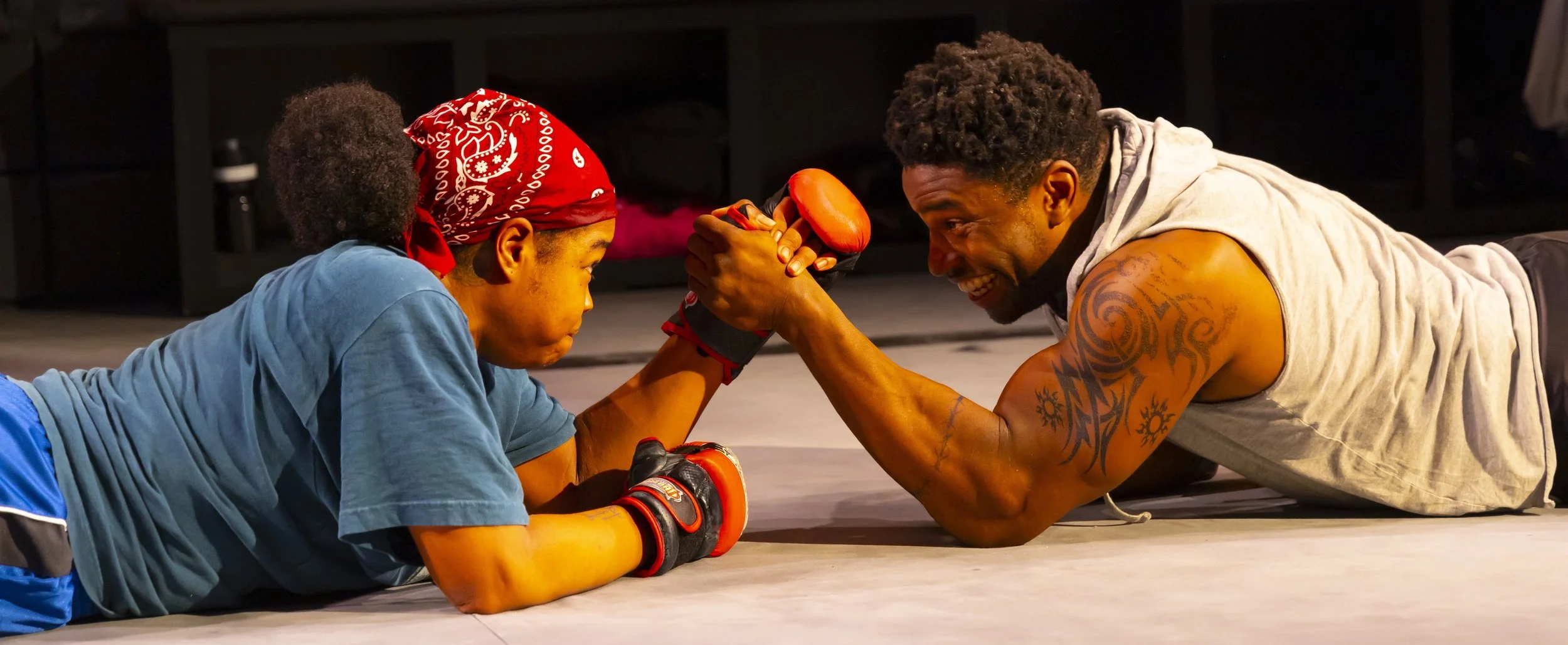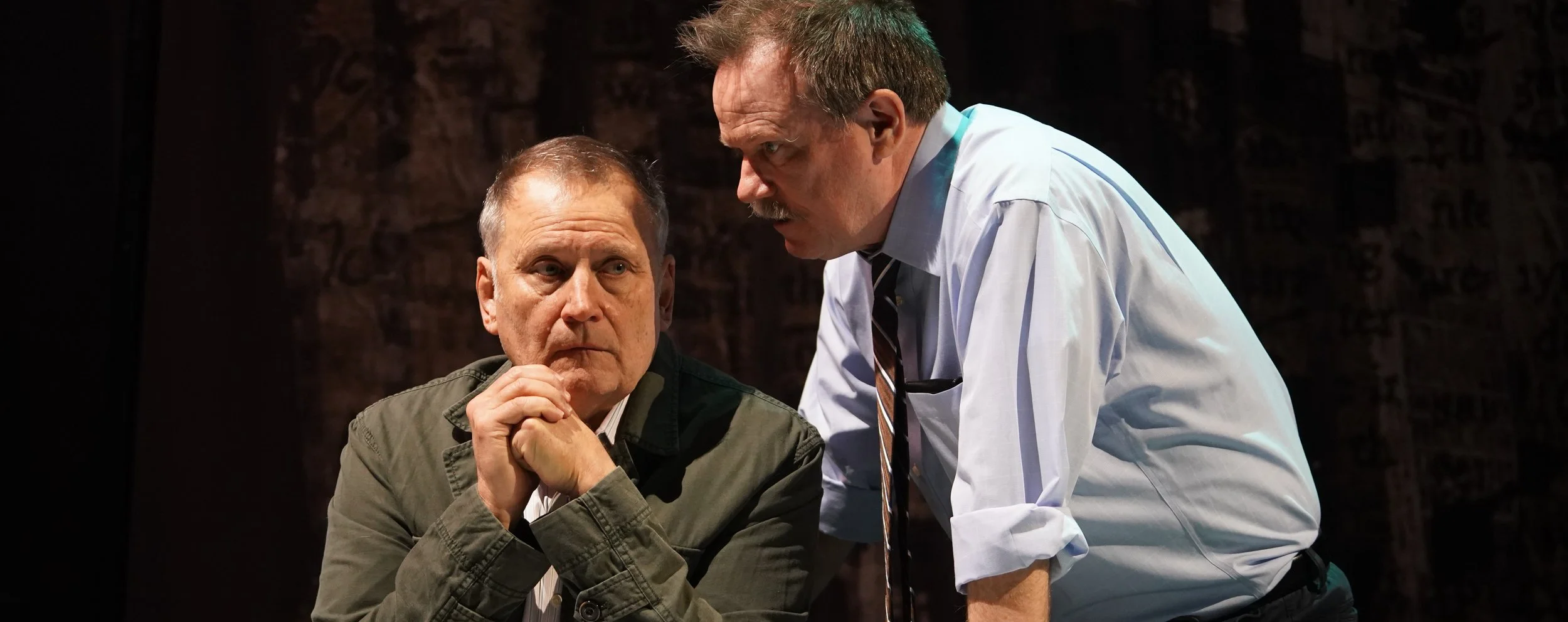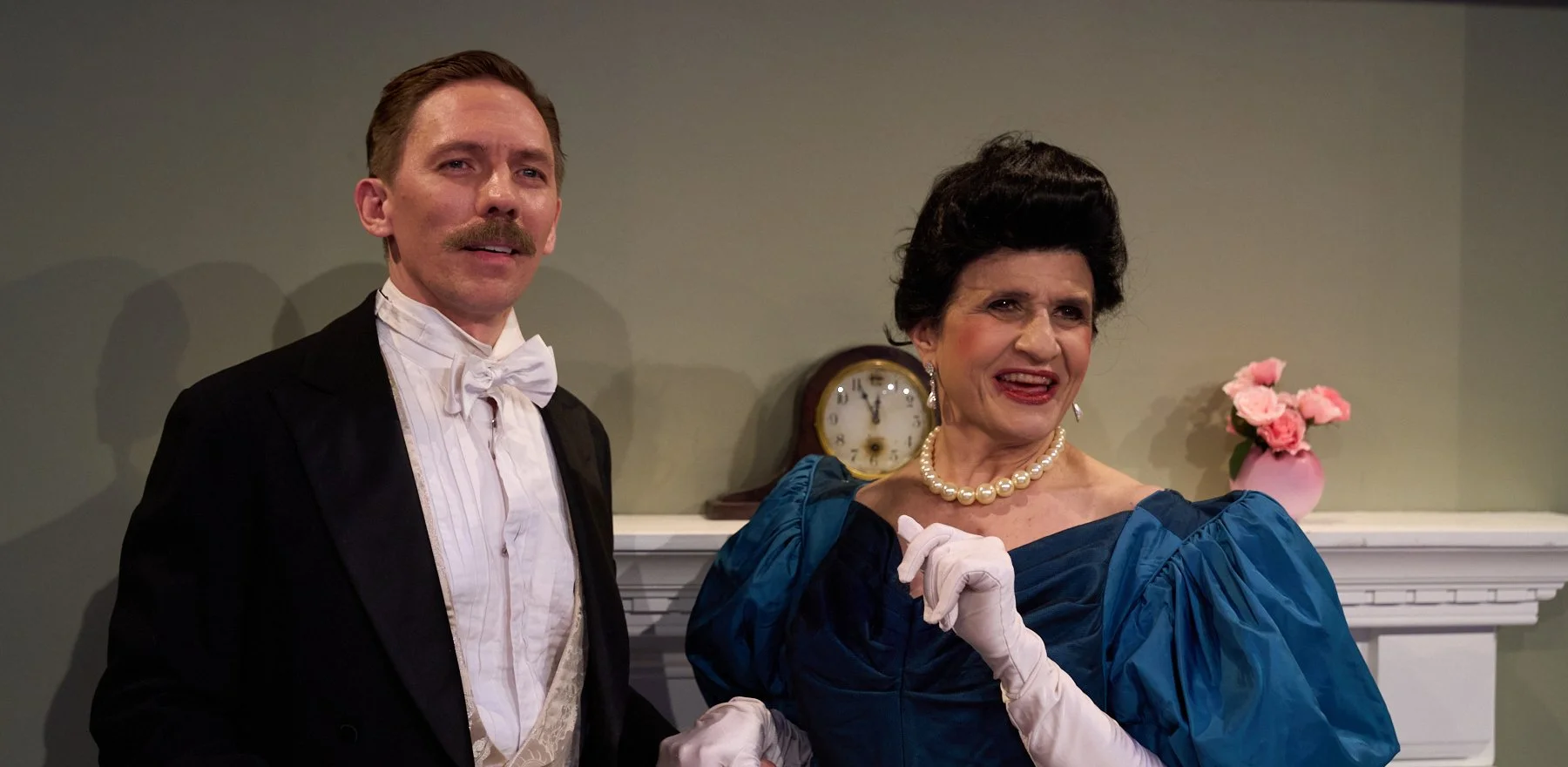Jonathan Spector’s This Much I Know is an erudite, ambitious, and wide-ranging play in the vein of Tom Stoppard. Three actors play dozens of parts, spanning nationalities and time periods; historical events and personages alternate with the everyday problems of people trying to navigate 21st-century life; and questions of cognition, epistemology, and politics are interrogated.
This Is Government
It’s a minor theatrical annoyance, but one that does irk some critics: When your set displays a large wall clock, center stage, make sure it’s running. The wall clock in This Is Government, Nina Kissinger’s disappointing new comedy at 59E59, displays 4:55 in the 15-minute first scene and stays there, with the three denizens of Washington’s Cannon House Office Building moving the hands manually to tick off the subsequent scenes in a roughly seven-hour dramatic arc. It plays amateurishly, and so, unfortunately, does much of This Is Government.
Dear Jack, Dear Louise
Ken Ludwig, who’s generally out to make his audiences laugh a lot and not think too hard (Lend Me a Tenor, Moon Over Buffalo, Crazy for You), strikes a more mellow and reflective tone than usual with his latest, Dear Jack, Dear Louise, at 59E59. An epistolary lark, it shares some traits with Pen Pals, still puttering away at St. Clement’s: two characters, a deepening relationship between them, lots of letters, punctuated by dialogue. Again, though, the audience doesn’t have to think too hard: Dear Jack, Dear Louise is friendly and diverting, but it sure is light.
Radio Downtown: Radical ’70s Artists Live on Air
Creative teams that turn popular movies into musicals are becoming commonplace on Broadway, but as Radio Downtown: Radical '70s Artists Live on Air demonstrates, it takes a rare breed of creator to unearth a collection of decades-old public radio interviews and transform them into a viable piece of Off-Broadway theater. Fortunately, Steve Cosson is just such a visionary.
The Greatest Hits Down Route 66
Histories come in all shapes and sizes and can be chronicled in any number of fashions. Family histories, each unhappy in their own way, may reveal personal pains that turn out to be strikingly universal. A country’s history can be told in terms of its politics, its geographic landmarks, its immigrants. And a people’s history can be reflected in its folk music. Any one of these might make for an engrossing night of theater. But when attempting to combine all three, finding the right balance and weaving a cohesive tale become a tall order. Such is the case with the New Light Theater Project’s production of The Greatest Hits Down Route 66, which finds itself short on songs, long on family dysfunction, and scattered on Americana.
Unconfined
Unconfined is a solo theater piece based on real-life events that asks a fundamental question: What does it mean to really know another person? In this case, the question is more difficult than usual, as the person to get to know is on lockdown on death row. The story of a seemingly kind, thoughtful, creative, and spiritually sophisticated convicted murderer came to playwright Liz Richardson’s attention when she “received a binder of extraordinary poems, drawings, and letters by a prisoner who had been on death row for 18 years,” as noted in the program. She wrote the piece based on her own research and interviews. Richardson portrays three characters who all interacted with the unseen, unnamed protagonist while he was imprisoned: Barbara, a professor of comparative religion at a Southern university; Eleanor, an English artist; and a fellow death-row inmate, Benny.
Dig
The plant-store setting of Theresa Rebeck’s play Dig might be reminiscent of Little Shop of Horrors, but in Dig the plants are the victims, not the aggressors—victims of human selfishness, anger, and desire. For Roger (Jeffrey Bean), the tightly wound owner of the store (which is named Dig), the damage done to plants is more keenly felt than the damage human beings do to others or to themselves; and it is also more easily addressed, as Roger is a master of restoring vitality and life to seemingly doomed plants. With people, he’d really rather not be bothered.
The Sabbath Girl
Cary Gitter’s The Sabbath Girl, produced by the Penguin Rep and currently at 59e59, is an attempt at a throwback romantic comedy, a story of two lonely souls from different cultural worlds who find each other in the big city and forge ahead in the name of love despite all the obstacles.
The Commons
Lily Akerman’s The Commons should come with a trigger warning for anyone who has ever had multiple roommates in a New York City apartment. She depicts four roommates (three millennials and one Gen Xer) as they navigate the harrowing questions and minutiae of shared space—the buildup of burnt tomato sauce on a stove top, the viability of leftover jars of food, the ethics of decluttering, the disappearance of chocolate almonds, the gendering of certain chores, and, God forbid, the presence of a mouse—with various shades of aggression and passive-aggression.
Everything Is Super Great
Stephen Brown’s Everything Is Super Great presents a group of likable, oddball, and somewhat hapless characters who don’t really fit in anywhere in the suburban Texas world they inhabit, but bond with one another amid unexpected circumstances. The word “great” works in the play as a form of deliberate denial, but also something genuinely hopeful: life is a series of vexations, large and small, for everyone on stage, and yet the characters, and the play itself, search for little moments of meaning and connection.
Operation Crucible
“Bang.” “Bang.” “Turn.” “Brush.” Apparently that’s how steel gets made, or got made in World War II, with two men pounding it, one positioning it, and one more readying it for the next step. And a lot of steel gets made in Operation Crucible, Kieran Knowles’s vigorous retelling of the Sheffield Blitz, a 1940 calamity in the South Yorkshire town. Part-documentary, part-character study, and all-teamwork, this four-man entry into 59E59’s Brits Off Broadway series is energetic and affecting, and a little disorganized.
The Edge of Our Bodies
A 16-year-old prep school student takes a train to New York City, spends some time in a bar, encounters odd sexual shenanigans in a hotel room, and struggles with an assortment of inner conflicts. In 1951, J. D. Salinger turned this scenario into gold with The Catcher in the Rye. But, in the TUTA Theater Company’s abstract and lumbering production of a 2011 play by Adam Rapp, these same elements hold little value. With extensive doses of narration broken only by a few unexplainable affronts of noise and light, The Edge of Our Bodies shares a border with the limits of our patience.
The Mad Ones
Kait Kerrigan and Brian Lowdermilk are the Rihanna of musical theater. Just as the Barbadian pop goddess releases hit song after hit song while selling relatively few albums, Kerrigan and Lowdermilk are less known for their plays than for their individual tunes, which have gained them a rabid online following. Their contemporaries Benj Pasek and Justin Paul (Dear Evan Hansen, La La Land) have conquered Broadway and Hollywood, but Kerrigan and Lowdermilk have connected with the millennial fan base like no other musical theater writers; they’re the official composers of the Internet. Now, several of their conversationally catchy pop songs have found their way into the long-gestating original musical The Mad Ones, playing at 59E59 Theaters.
Charolais
There may be no better, or more controversial, example of humankind’s uneasy attempts to shape nature than the cow. When celeb geek Neil deGrasse Tyson recently tweeted that cows are “biological machine(s) invented by humans to turn grass into steak,” avowed vegan Moby took to Instagram to call him an “ignorant sociopath” for making light of the “unspeakable suffering” humans wreak on billions of animals a year. Irish company Fishamble’s genial Charolais at 59E59 mines this same tension for dark humor and pathos, but with a much more intimate beef, between an Irish woman and a French heifer over the man who loves them both.
Summer Shorts: Series B
No matter how oppressively hot a New York summer can be, one of the dramatic oases in it has become the Summer Shorts Festival of New American Short Plays at 59E59 Theaters. Founded by artistic director (and often actor) J.J. Kandel 11 years ago, the mini-festival presents two bills of one-acts in repertory for several weeks. This year, Series B of Summer Shorts features Break Point, written and directed by Neil LaBute; A Woman, by Chris Cragin-Day, directed by Kel Haney; and Wedding Bash, written by Lindsey Kraft and Andrew Leeds, and directed by Kandel himself.
Fossils
Bucket Club’s inventive Fossils is one of the quirkier Brits Off Broadway 2017 entries so far, with its plastic dinosaur people and range of questionable accents. If the script doesn’t equal the rich world that the company conjures through sound and light, the play is still a beautiful reminder of the diverse material that Britain’s robust training system and government arts subsidies can produce.
Angel and Echoes
The theater has not been kind to the English port city of Ipswich lately. Alecky Blythe’s documentary musical London Road, a huge hit for London’s National Theatre and recently made into a film featuring a singing Tom Hardy (no, really), shows Ipswich’s working class to be petty and vindictive. In the revival of Henry Naylor’s Echoes, part of a double bill with new play Angel at the Brits Off Broadway festival, Ipswich is such a “dungheap” that it drives two women into the arms of religious extremists in Afghanistan and Syria. Compared to the hellscapes in which the women of Naylor’s “Arabian Nightmares” find themselves, though, Ipswich is the Garden of Eden.
A Gambler’s Guide to Dying
There’s a famous joke about a man who prays for years to win the lottery. He tries to live a righteous life and promises to use the money for good, but his prayers grow increasingly bitter. One day, as he’s leaving church, having given God an earful, the clouds part and a voice booms, “Hey, moron, you have to buy a ticket!” A Gambler’s Guide to Dying, which launches 59E59’s 13th annual Brits Off Broadway festival this week, is about a man for whom buying the ticket is more than good advice; it’s his life philosophy.
Feathered Enemies
The Birds, Conor McPherson’s creepy new play, is derived neither from Aristophanes nor Alfred Hitchcock. It does, however, share DNA with the 1963 film because both draw from a short story by Daphne du Maurier. (Hitchcock also used du Maurier novels as source material for Jamaica Inn and his Oscar-winning Rebecca.) Don’t expect to find real birds or even simulated ones in the pocket drama at 59E59 Theaters. Fans of the movie won’t find a pompous female ornithologist with environmental concerns or a schoolteacher with her eyes pecked out either.
























